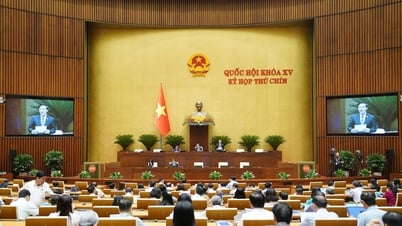In terms of inflation, the 2020-2024 period is about 12.58%, compared to the base period of 2020, the increase is about 28%. This means that even though per capita income increases by 30.2%, actual purchasing power may not increase accordingly. In particular, during this period, the rate of increase in personal income tax is not only faster than per capita income but also does not accurately reflect the change in actual income.
These analyses show that it is necessary to review the family deduction level to ensure a fair tax policy, consistent with the reality and living standards of workers - an expert stated his opinion. In fact, the proposal to adjust the family deduction level has been proposed many times. However, the Ministry of Finance's viewpoint is still that it cannot be implemented due to reasons such as the consumer price index (CPI) fluctuating less than 20%. Another reason is that the current deduction level for taxpayers is 2.2 times higher than the average income per capita, much higher than the common level applied by other countries from 0.5 - 1 times...
The family deduction level is clearly outdated when it is not updated according to the fluctuations of the minimum wage, prices, and inflation. In addition, too many tax rates and too many gaps between tax rates in the progressive tax schedule have caused pressure and created a tax burden. These are the biggest shortcomings of the personal income tax policy, so the amendment cannot be delayed any longer.
Fortunately, the Ministry of Finance recently announced that the draft Law on Personal Income Tax has raised the issue of studying increasing the family deduction level for taxpayers and dependents to ensure consistency with the developments of the consumer price index and macroeconomic indicators in recent years. At the same time, it contributes to reducing the burden on taxpayers... However, this is only the stage of drafting the outline, so it only focuses on clarifying the problems and shortcomings that need to be revised and supplemented. The detailed content and specific assessment will be studied and proposed when included in the National Assembly's Law and Ordinance Development Program.
Taxes, fees and charges are state tools that contribute to managing, regulating, stabilizing the macro-economy, restructuring the economy, and mobilizing resources to ensure the economy grows in quality, efficiency, and develops rapidly and sustainably. Personal income tax is one of nine types of taxes, contributing more than VND 198,000 billion in total revenue estimated at more than VND 1.9 million billion in 2024, accounting for about 10% of total revenue.
However, Decision No. 508/QD-TTg on approving the Tax System Reform Strategy to 2030 clearly identified the need to complete and synchronize the tax policy system, including personal income tax, in accordance with the standards of the tax system according to international practices, while meeting the resource requirements to implement the 10-year Socio-Economic Development Strategy 2021 - 2030.
Therefore, according to an expert, it is necessary to ensure that after paying personal income tax, taxpayers still have enough to cover their average living expenses. To do this, the issue is to determine a reasonable deduction level when amending the Personal Income Tax Law, thereby ensuring fairness in regulating people's income as well as taxpayers' lives.
Source: https://daibieunhandan.vn/can-co-muc-giam-tru-hop-ly-post410749.html


![[Photo] Prime Minister Pham Minh Chinh chairs conference on anti-smuggling, trade fraud, and counterfeit goods](https://vphoto.vietnam.vn/thumb/1200x675/vietnam/resource/IMAGE/2025/5/14/6cd67667e99e4248b7d4f587fd21e37c)























































































Comment (0)